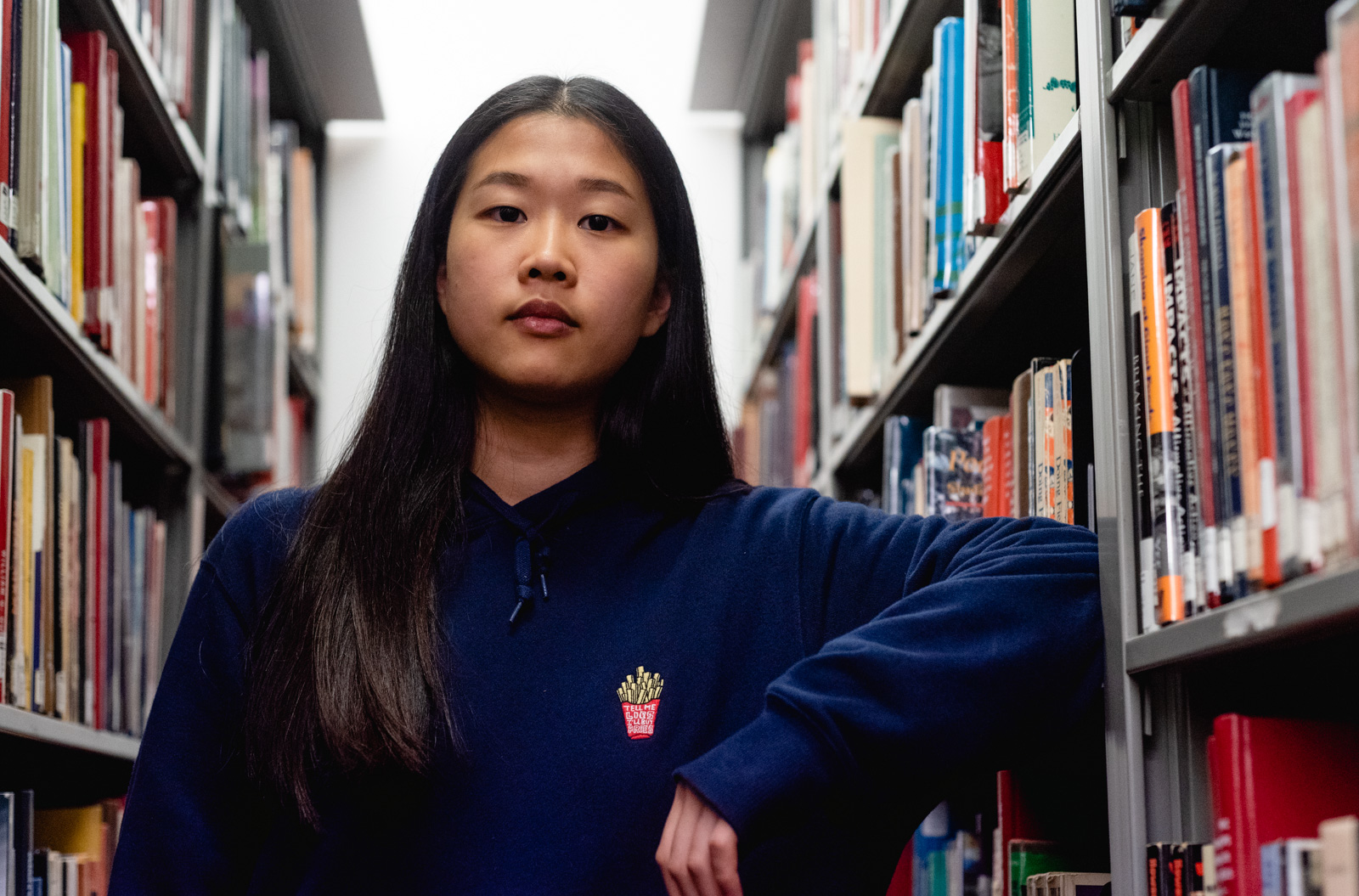Students offer perspectives on benefits, drawbacks of work-study jobs

Hope Shin, a second-year undeclared student, works in the Asian American Studies Center Library. She works about seven hours a week and has learned to balance her job and school. (Anirudh Keni/Daily Bruin)
By Albert Zhang
Jan. 17, 2019 11:09 p.m.
It was only 5:30 a.m., but Maya Ervin was at work, helping out athletes at her sports medicine internship. She would finish at noon, grab a quick lunch, go to class and go back to work until 8 p.m.
Thousands of UCLA students participate in work-study, holding jobs on and off campus in order to meet financial needs. For these students, proper time management is crucial in order to juggle work, academics and a social life.
Hope Shin, a second-year undeclared student, works in the Asian American Studies Center Library. She works approximately six to seven hours a week and has learned to balance her job and schoolwork.
“There’s less time to rest or do nothing, or just go on YouTube or Facebook,” Shin said. “Now that I don’t have my afternoons because I work, I just have to be more strategic on when I’m going to get my class stuff done.”
Daniel Hou, a second-year applied math student who works in Bruin Cafe, said getting a job helped add more structure to his days. He added that working helped him overcome his procrastinating habits.
“It felt like in the first two quarters, I had too much free time,” Hou said. “It gave me a schedule for my days, and I put better use to the days I don’t work.”
Ervin, a third-year psychology student, juggles three positions on campus. She works up to 20 hours combined as a front desk worker in the John Wooden Center, as an intern for sports medicine and as a resident assistant on the Hill.
“I get a lot of my work done on the weekends. Time management is a big thing, and I just like staying organized,” Ervin said. “So far, three years in, it hasn’t impeded on my ability to hang out with my friends or study, so that’s nice.”
Students are also usually given flexibility in their work schedule to ensure they have enough time for their schoolwork.
“Before midterm or finals week, (my boss) will say if I need to not come to work because I’m busier, it’s okay,” Shin said. “Some jobs, you don’t really have that choice, if you can’t come to work you have to find someone to cover for you.”
As an RA, Ervin also has a flexible work schedule. She said that her bosses understand that students are quite busy and may need to make adjustments to their work hours. She said that she is often able to schedule or change meetings to accommodate her schedule.
However, many students said having a loaded work and class schedule has affected their social lives.
For Shin, the biggest consequence was having less time for meals than before. She said that she would normally meet up with friends for lunch before she got a job, but now she will typically just grab a quick bite before heading to the library.
“I would still meet up with people on campus, but it wouldn’t be for a meal. I would just have to compensate for it in different ways,” Shin said. “But also, it was different, meeting up with people over a meal versus just hanging out.”
On the other hand, Hou said getting a job has allowed him to do more activities with his friends. He added that he can now afford to go out with friends outside of UCLA because of his extra income.
Shin said she is still able to maintain her commitment to her extracurricular activities such as Grace on Campus and Super Mileage Vehicle.
“All my extracurricular stuff is in the evening,” Shin said. “I still want to do that stuff, so if I had to work more, it would just take away from my sleep.”
Both Shin and Hou are satisfied with the amount of sleep they get, but for students who work longer hours, setting aside enough time for sleep and maintaining a balanced lifestyle can be a struggle.
Steven Huang, a second-year mechanical engineering student, worked around 18 to 20 hours a week as an assistant for the UCLA Housing and Hospitality team.
“I ultimately left the job because I got sick due to my lack of sleep and because I reached a point where I could not manage my time with the given activities,” Huang said. “I wanted to focus on academics and clubs, which aid in my long-term career.”
Ervin initially quit her job at the John Wooden Center because it consumed too much of her time. She later returned to the job to work reduced hours.
“I had quit my freshman year because I was an RA, and they just asked if I would come back and just work a short amount of time, which I was happy to do,” Ervin said. “It’s nice to go back to Wooden and have that source of income.”
Huang said that he was often very tired due to his job, which hindered his ability to learn in class. He also added that he felt more detached from his friends because he couldn’t hang out with them as much.
“I essentially gave up my time, which is one of the most valuable commodities that I owned, for money,” Huang said. “That’s all jobs, but I decided I had different priorities for my time, that I could have spent exercising, studying more, hanging out or sleeping.”

